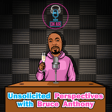
Womanist Bioethics: Faith, Policy & Action With Dr. Wylin Wilson
Black maternal health is a crisis — Black women face far higher maternal mortality and maternal mental-health risks. In this episode Dr. Wylin Wilson (author of Womanist Bioethics: Social Justice, Spirituality, and Black Women's Health) joins Bruce Anthony to trace the history of segregated hospitals, unpack the Momnibus and Pregnant Workers Fairness acts, and explain how the Black church, doulas, midwives, and cross-sector collaboration can drive real birth equity. We discuss postpartum depression in Black mothers, why suffering has been normalized, the policy wins we need (Medicaid reimbursement for doulas, workplace accommodations), and practical ways faith communities can become sanctuaries and first responders for maternal care. Tune in to learn concrete actions you can take in your state, how to partner with grassroots groups like Black Mamas Matter Alliance, and why centering the most vulnerable advances justice for everyone. #blackmaternalhealth #maternalmentalhealth #healthequity #womanistbioethics #Momnibusact #DrWylinWilson #unsolicitedperspectives
🔔 Hit that subscribe and notification button for weekly content that bridges the past to the future with passion and perspective. Thumbs up if we’re hitting the right notes! Let’s get the conversation rolling—drop a comment and let’s chat about today’s topics.
🚨 Get access to the Uncensored conversations — raw, unfiltered, and unapologetically bold.
💥 Tap in for exclusive episodes, spicy extras, and behind-the-scenes chaos you won’t find anywhere else:
🔓 Unlock it on YouTube Memberships: https://www.youtube.com/channel/UCL4HuzYPchKvoajwR9MLxSQ/join
💸 Back us on Patreon: patreon.com/unsolicitedperspectives
This isn’t just content. It’s a movement.
Don’t just watch — be part of it.
Thank you for tuning into Unsolicited Perspectives with Bruce Anthony. Let's continue the conversation in the comments and remember, stay engaged, stay informed, and always keep an open mind. See you in the next episode!
#podcast #mentalhealth #relationships #currentevents #popculture #fyp #trending #SocialCommentary
Chapters:
00:00 Voices for Change: Black Women, Faith & Health Equity 🎙️🙏🏾💥
00:21 Welcome to Unsolicited Perspectives 🎙️
00:47 Black Women & Healthcare: Dr. Wylin Wilson Interview 🎙️💔
02:35 Dr. Wilson's Journey: From Family Love to Bioethics 💝
08:24 Hospital Segregation: A Hidden History Revealed 🏥
13:25 The Black Church's Legacy of Healthcare & Community Care ⛪
18:24 Normalizing Black Suffering: The Root of Health Disparities 💔
22:32 Fighting Fatigue: How Love Fuels the Fight for Justice ✊
26:10 We Are Sanctuary: Our Moral Responsibility to Each Other 🕊️
31:27 Women is Bioethics: Centering the Vulnerable for Common Good 📚
32:29 The Black Church's Unique Strengths in Health Advocacy 🙏
36:31 Maternal Mental Health Crisis in Black Communities 🤰
39:58 The Momnibus Act & Critical Maternal Health Legislation 📋
43:18 History Under Attack: Why Our Stories Matter Now 📖
46:07 Taking Action: Collaboration for Birth Equity & Change 🤝
48:11 Strategy Session: Bringing All Sectors Together for Care 💪
50:12 Breaking Down Barriers: Discovering We're Mistaken About Each Other 🌉
52:28 Thank You for Rocking With Us! Subscribe & Share 🎬
Follow the Audio Podcast:
Apple Podcast: https://podcasts.apple.com/us/podcast/unsolicited-perspectives/id1653664166?mt=2&ls=1
Spotify: https://open.spotify.com/show/32BCYx7YltZYsW9gTe9dtd
www.unsolictedperspectives.com
Beat Provided By https://freebeats.io
Produced By White Hot

